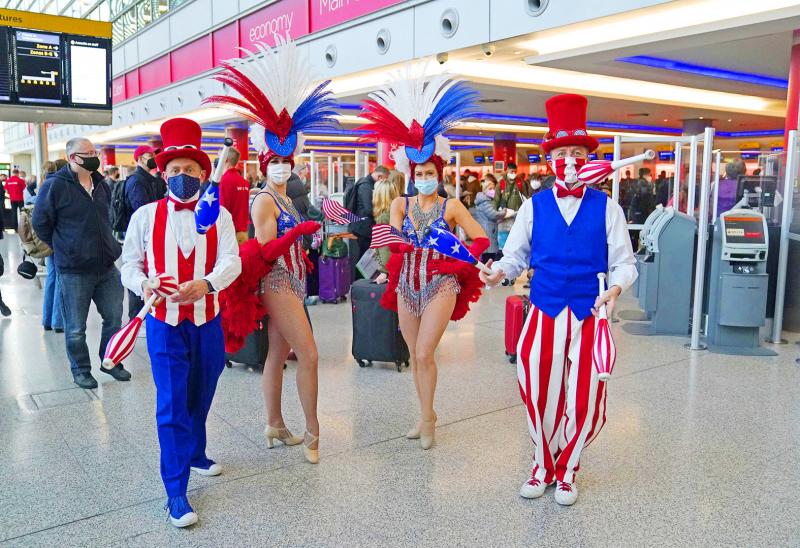The US yesterday reopened its land and air borders to foreign visitors fully vaccinated against COVID-19, ending 20 months of restrictions on travel from around the globe that separated families, hobbled tourism and strained diplomatic ties.
The ban, imposed early last year by former US president Donald Trump and upheld by his successor, US President Joe Biden, has been widely criticized and become emblematic of the upheavals caused by the pandemic. The restrictions were particularly unpopular in Europe, and US neighbors Canada and Mexico.
In an effort to slow the spread of COVID-19, US borders were closed after March last year to travelers from large parts of the world, including the EU, Britain and China, India and Brazil. Overland visitors from Mexico and Canada were also banned.

Photo: AP
The months of restrictions affecting hundreds of millions of people helped fuel personal and economic suffering brought on by the COVID-19 pandemic.
“It’s been so hard,” Alison Henry, 63, told reporters. “I just want to see my son.”
The British woman planned to fly to see her son in New York yesterday, after 20 months of separation.
Families on both sides of the Atlantic are eager to reunite with their loved ones.
Although travel from the US to Europe has been possible since the summer, foreign US residents holding certain visas have had no guarantee of re-entry.
To cope with surging demand, airlines have increased the number of transatlantic flights and plan to use larger planes, as they work their way out of the pandemic crisis.
Along the border with Mexico, many cities in Texas and California have faced economic struggles due to trade restrictions.
Authorities in Mexican border cities said on Sunday that there would be long lines at crossings.
The reopening also caused a shortage of US dollars in currency exchange centers in Ciudad Juarez, Mexico.
In the US’ northern neighbor, seniors would be able to resume their annual trips to Florida to escape the bitter Canadian winters.
However, the cost of polymerase chain reaction tests Canada requires for cross-border travel — up to US$250 — can be prohibitive.
US Representative Brian Higgins of New York, whose district touches the Canadian border and includes the US side of Niagara Falls, planned to hold a news conference yesterday with mayors from both countries to urge Canada to drop its testing requirement.
Lifting the travel ban would affect more than 30 countries, but entry into the US would not be totally unregulated: US authorities plan to closely monitor travelers’ vaccination status and would still require them to present negative COVID-19 tests.
The US, from yesterday, would require air passengers to be fully vaccinated and be tested within three days before travel. Airlines would be required to put in place a contact tracing system.
The land border opening is to happen in two phases.
Starting yesterday, vaccines would be required for “non-essential” trips — such as family visits or tourism — although unvaccinated travelers would still be allowed into the country for “essential” trips, as they have been for the past year and a half.
A second phase, beginning in early January, would require all visitors to be fully vaccinated to enter the US by land, no matter the reason for their trip.

Drug lord Jose Adolfo Macias Villamar, alias “Fito,” was Ecuador’s most-wanted fugitive before his arrest on Wednesday, more than a year after he escaped prison from where he commanded the country’s leading criminal gang. The former taxi driver turned crime boss became the prime target of law enforcement early last year after escaping from a prison in the southwestern port of Guayaquil. Ecuadoran President Daniel Noboa’s government released “wanted” posters with images of his face and offered US$1 million for information leading to his capture. In a country plagued by crime, members of Fito’s gang, Los Choneros, have responded with violence, using car

The team behind the long-awaited Vera Rubin Observatory in Chile yesterday published their first images, revealing breathtaking views of star-forming regions as well as distant galaxies. More than two decades in the making, the giant US-funded telescope sits perched at the summit of Cerro Pachon in central Chile, where dark skies and dry air provide ideal conditions for observing the cosmos. One of the debut images is a composite of 678 exposures taken over just seven hours, capturing the Trifid Nebula and the Lagoon Nebula — both several thousand light-years from Earth — glowing in vivid pinks against orange-red backdrops. The new image

CYBERCRIME, TRAFFICKING: A ‘pattern of state failures’ allowed the billion-dollar industry to flourish, including failures to investigate human rights abuses, it said Human rights group Amnesty International yesterday accused Cambodia’s government of “deliberately ignoring” abuses by cybercrime gangs that have trafficked people from across the world, including children, into slavery at brutal scam compounds. The London-based group said in a report that it had identified 53 scam centers and dozens more suspected sites across the country, including in the Southeast Asian nation’s capital, Phnom Penh. The prison-like compounds were ringed by high fences with razor wire, guarded by armed men and staffed by trafficking victims forced to defraud people across the globe, with those inside subjected to punishments including shocks from electric batons, confinement

Canada and the EU on Monday signed a defense and security pact as the transatlantic partners seek to better confront Russia, with worries over Washington’s reliability under US President Donald Trump. The deal was announced after a summit in Brussels between Canadian Prime Minister Mark Carney and European Commission President Ursula von der Leyen and European Council President Antonio Costa. “While NATO remains the cornerstone of our collective defense, this partnership will allow us to strengthen our preparedness ... to invest more and to invest smarter,” Costa told a news conference. “It opens new opportunities for companies on both sides of the